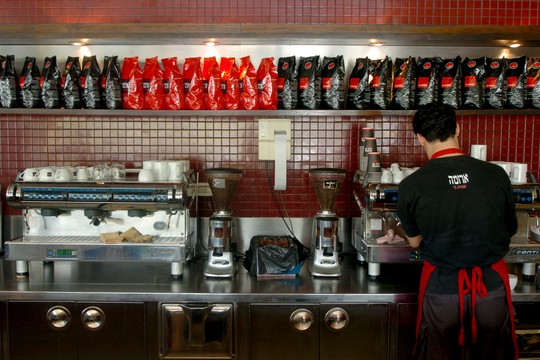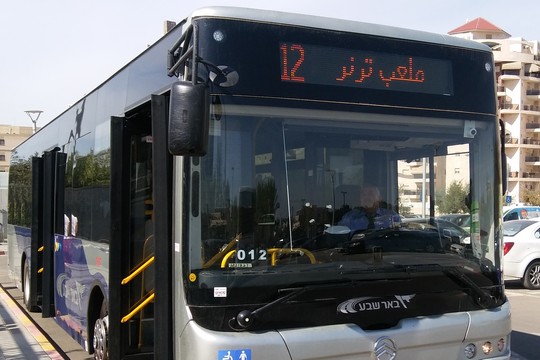A branch of Aroma Espresso Bar in central Israel tells its Arab workers that speaking their mother-tongue is offensive to some of the customers.
By Yael Marom

A branch of “Aroma Espresso Bar,” one of Israel’s most popular coffee chains, told its Arab workers last week that they are no longer allowed to speak Arabic at work, following customer complaints.
“I am reminding you that our goal is to make our customers feel wanted, and not uncomfortable,” wrote the franchise manager of the Kfar Saba branch, in central Israel, in a WhatsApp message sent to the workers last week.
“It is important you understand that this is not against the Arabic language. By the same token, it could have been Russian or Ethiopian or any other language that the customers cannot understand. Speaking to people in a language they understand is a matter of basic manners,” she explained, requesting that the workers speak to customers in Hebrew only.
The Arab workers were also allegedly summoned in pairs to speak to the manager about the new policy. During these conversations, it was made clear to the workers that the rule applies to conversations among them that take place during work. Some of the workers, who were insulted by the decision, called the policy racist and said they would not stand for it. One of the workers even told the manager, “I am an Arab, this is my language. It’s an embarrassment that the company even takes these kinds of complaints.”
There are approximately 10 Arab workers at Aroma’s Kfar Saba Branch — nearly half of the total staff. The branch serves many Arab customers from the neighboring towns and cities, including Tira and Taybeh, including doctors and medical staff who work at the nearby Meir Medical Center.
Attorney Shada Aamer of the Association for Civil Rights in Israel (ACRI) explains that this kind of policy violates the 1988 Employment (Equal Opportunities) Law, which forbids discriminating against employees over their nationality, origin, religion, etc., and applies to all languages, whether Arabic, Russian, or Amharic. However, Aamer says, the language in question is also the mother-tongue of 20 percent of Israel’s citizens. “The court ruled that discomfort and suspicion toward the other who speaks Arabic is not protected by the law. Thus, for example, the benefit of Aroma’s employees cannot be used to protect the employer when he/she violates the Employment (Equal Opportunities) Law,” Aamer explains.
This is certainly not the first time Arabic has frightened both customers or the authorities, leading to an attempt to erase it from the public space. Late last year, the Dan bus company gave in to boycott threats and stopped its Arabic announcements in the southern city of Be’er Sheva. Also last year, Tel Aviv University forbade employees at one of its call centers from speaking Arabic with callers, even if the latter were Arabic speakers.

“The fear of hearing Arabic in the public sphere arises once in a while, and not only in places of work,” Aamer says.
In response, Joint List Chairman Ayman Odeh told Local Call that the government’s delegitimization and erasure of both the Arabic language and culture led by the government is trickling down to some citizens. “Arabic is not only an official language of the state, it is also the mother-tongue of a fifth of its citizens, and there are many Jewish citizens who immigrated here from Arab countries — they are a natural part of this country,” Odeh said.
“I call on the cafe’s management and the entire chain to retract this offensive and illegal policy and to work toward mutual respect and strengthening the shared space we are trying to build here.”
In response to the above claims, Aroma Espresso Bar offered the following response:
Aroma forbids each and every one of its franchise to express any kind of racism, including preventing its workers to speak among themselves in a particular language (including Arabic, Russian, or Amharic). Clear directives on this issue have, from time to time, been sent out to the franchises. This was a case of an independent franchise, which sought, through inaccurate phrasing, to refrain from partaking in conversation that customers did not understand next to customers.
The message sent by the manager immediately thereafter clarifies this: “Of course if a customer speaks to you in Arabic you may answer him in Arabic, but the important principle is not to give people the feeling that they or their order are being spoken about and they cannot understand.
Of course, we clarified the directives once again for all our franchises.
Yael Marom is Just Vision’s public engagement manager in Israel and a co-editor of Local Call, where this article was originally published in Hebrew.

